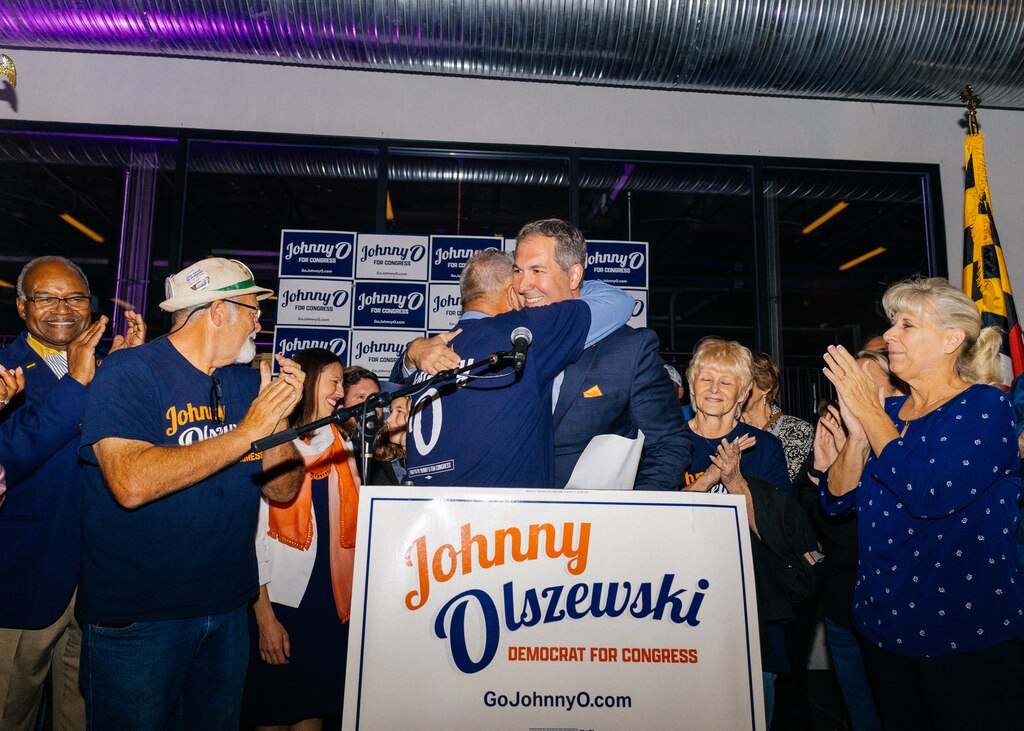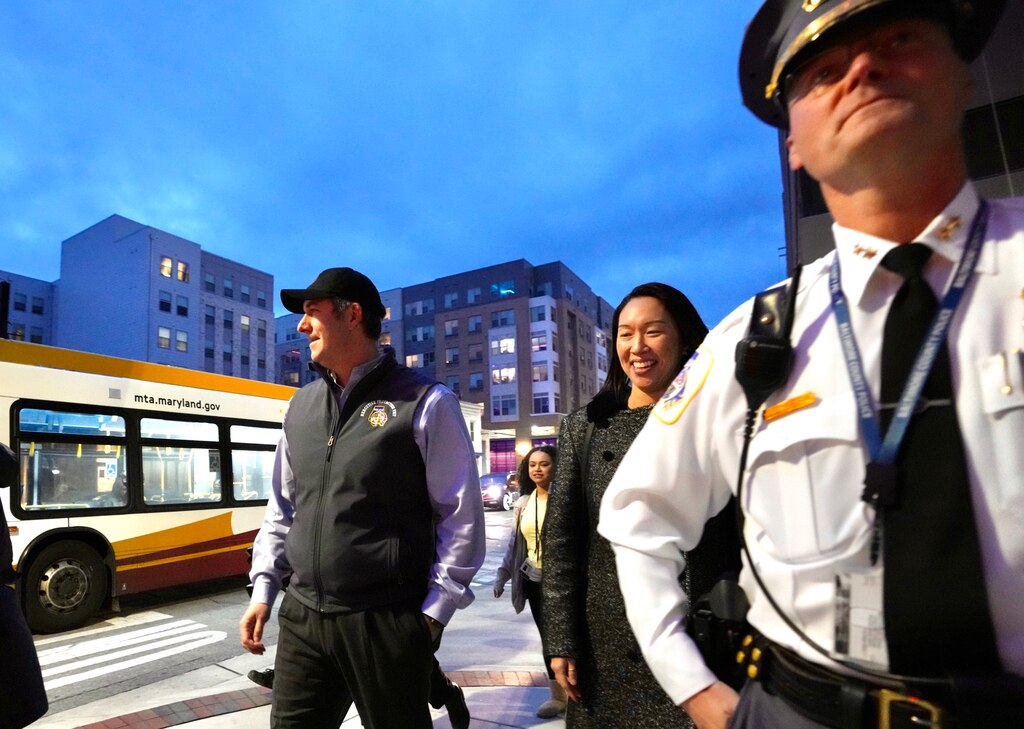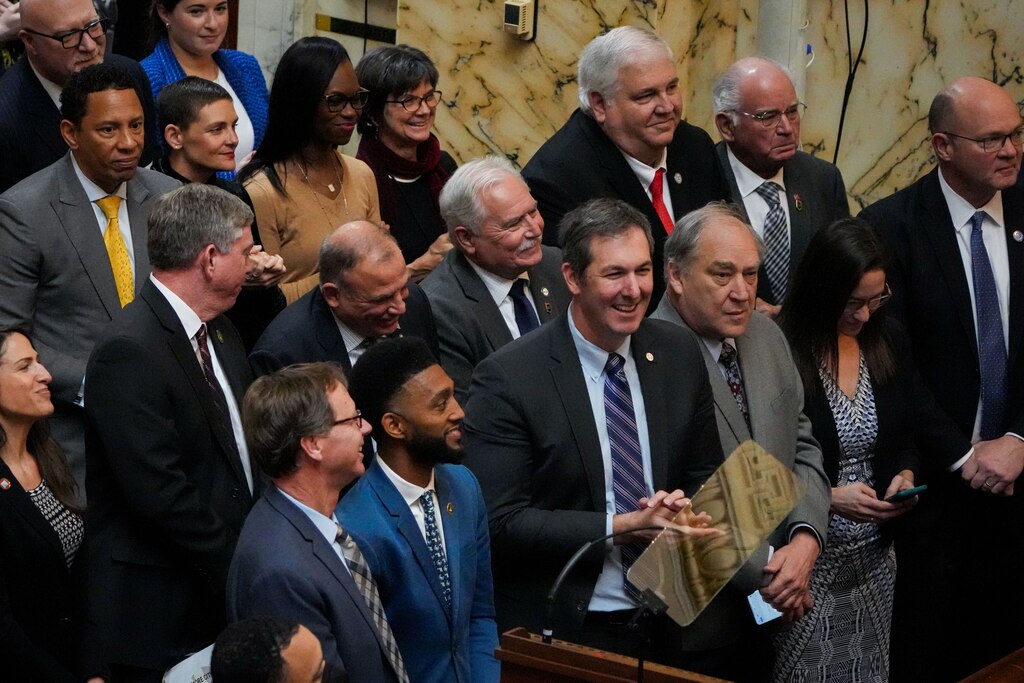In mid-December, a couple of weeks before Baltimore County Executive Johnny Olszewski Jr. vacates his county office, 20 unfolded boxes leaned against a chest and framed mementos from his political career were stacked on the floor.
The stripped-down room marked the latest crescendo in Olszewski’s career in local politics. In November, he won a congressional seat that opened when Rep. C.A. Dutch Ruppersburger announced he would retire after 22 years in office. Olszewski starts his new job in the House of Representatives on Jan. 3, which cuts his tenure as county executive two years short.
The County Council plans to appoint a two-year replacement on Jan. 6.

The new job is a drastic shift in power dynamics for Olszewski. As Baltimore County’s top official, the Democrat could move on most major local issues relatively quickly. Congress, though, will be a majority-Republican minefield of polarized politicians known for moving at a glacial pace.
The Baltimore Banner thanks its sponsors. Become one.
The Baltimore Banner sat down with Olszewski to chat about his six years as Baltimore County executive and what’s next. The interview has been edited for clarity and brevity.
What did you expect the county executive job to be like, and is it different from what you thought?
I don’t think I appreciated how disconnected residents felt to their government, and that was a big part of why I ran. But the response that we saw when we started to turn government inside out was overwhelming. Even the the most recent public forums on what residents are looking for in the next county executive, the fact that you had dozens of people testify and hundreds of people show up to the council meeting is indicative of how that relationship has changed.
I don’t think I appreciated just how deeply it needed to change, how desperate people were for that connection. Our budget town halls were one of the signature things that I think we accomplished. To now have hundreds to thousands of people show up is a real testament to what we’ve done, but also to the partnership we’ve had with the people of Baltimore County.
What are your proudest accomplishments?
The Baltimore Banner thanks its sponsors. Become one.
I think it’s our openness, our transparency, our connectedness with the public. It’s not just the town halls, it’s the Office of Community Engagement, it’s Baltimore County standard dashboards, it’s Open Checkbook, 311 — all of the kind of good governance and public-serving, public-facing service that we provided. It’s creating the Office of the Inspector General.
It’s expanding the County Council, which is really rooted in this idea that government that is responsive to and connected to the people it serves is the best kind of government.
That has equipped us to do things like put forward billions of dollars of school construction, $200 million of [recreation] improvements, record funding on road resurfacing. It’s what’s allowed us to bring back glass recycling, start bulk trash pickup.
And then they have done all of that while also responding to the worst health crisis of our lifetimes, which lasted for years, in a way that was nationally recognized.
Some people have pushed back on your efforts to diversify the administration and said that it came at the cost of picking the best people. What are your thoughts?
The Baltimore Banner thanks its sponsors. Become one.
Our directors are as qualified, if not more qualified, than any other director or folks in similar positions across the country. What we’ve done is we’ve hired the most competent, capable and committed leaders that we could with an open mind to or without excluding people because of their diversity.
Far too often, people who are otherwise capable and talented aren’t given the opportunities and what we’ve done here in Baltimore County is we’ve created those opportunities: the first Black female administrative officer, first ever female and Black police chief and fire chief, first and second ever Asian American department heads in Baltimore County, first ever Hispanic American department head in Baltimore County’s history.
Our decisions are better because those perspectives and viewpoints are a part of our conversations.
A week ago, we had a mass shooting in Towson. What is your read on the state of crime in Baltimore County and how has that changed?
What happened this past week was shocking and awful because it’s so far out of the norm for that community and so far out of the norm for Baltimore County. The numbers show that in the last two years, we had one of the most significant reductions in homicide in our county’s history. This year even after the horrific incident, we’re on track to have another reduction.
The Baltimore Banner thanks its sponsors. Become one.
Any crime, particularly any homicide, is one too many. We don’t rest on our laurels. I would say Baltimore County is an incredibly safe place to live, work and raise a family.
We also know that how people feel matters, too. That’s why we are committed not only to making sure that we hold those individuals who committed these most recent actions accountable, but also that we work with communities to do other things to make sure that they feel safe, whether it’s additional patrols or ... camera programs, we have more license plate readers.

We’re doing upstream investments in things like recreational parks and workforce development. We’re going to be actually taking down a former hotel that had over 400 calls for service just last year alone.
It’s taking that holistic approach where we both support public safety organizations and our police department, but also sort of look at the whole picture, and it’s working.
People largely agree housing has become more unaffordable over the years. How has the state of housing changed under your leadership?
The Baltimore Banner thanks its sponsors. Become one.
Housing is one of the things that I think is so foundational to success.
That’s why I use the term attainable housing. It’s not just about being able to afford housing, but it’s also that it’s high quality, that it’s connected to good schools and open space and job opportunities, transportation options.
We’ve really gone all in to try to make that part of our focus, especially these last two years. We’ve also tried to support things like mixed-use zoning. So, we came to a compromise with the County Council where we now have the opportunity for them to put overlay districts in some of our aging shopping centers so that we are bringing those aging or dying locations back to life while also providing places for people to live.
What advice would you give the next county executive?
Listen to the public and those surrounding you. I have benefited tremendously from having a talented, diverse team and from trying to be above and beyond in our regards to public engagement, be they town halls, surveys, soliciting emails and phone calls.
The Baltimore Banner thanks its sponsors. Become one.
Decisions are best made when they’re done through a thorough process that is open, that’s inclusive.
What do you foresee as the biggest challenges for the next executive?
There are a lot of headwinds that are at play that could jeopardize things for the county, particularly as the Trump administration assumes office. They’ve been very open and vocal about their desire to take on the federal workforce, which Maryland relies upon significantly.
That could have a detrimental effect to local revenue, state revenues.
The state is facing staggering deficits. That’s going to be a problem not just for Baltimore County, but also for all local jurisdictions.

The public has been overwhelmingly supportive of the investments we’ve been making in schools and parks, and roads, other public amenities. However, you know that really is funding that will support projects that are all basically committed to and in progress.
I’ve been clear with the council and the public that if the county is going to continue the level of investment on the capital side, they’re going to have to find ways to pay for it.
That’s a conversation that the next county executive [and] members of the council will have to have should they want to sustain.
You are going to step into a Congress and presidency that will be controlled by Republicans. What role do you see for yourself in the House, and how will you accomplish your goals?
Like I’ve done here in Baltimore County, I’m coming to this work as a problem solver. I certainly have certain values and principles that I carry with me in that work, but one of those principles and values is that compromise is important and that it can be accomplished.
We can compromise without compromising our core values. I think I’ve proven that as county executive. We’ve got four Democrats and three Republicans on our County Council. But we’ve had almost every single vote in Baltimore County on budgets, gun safety legislation, common sense police reform amass a 7-0 or 6-1 vote. That speaks to the fact that these things can be bipartisan.
Some might argue that it is hard to compromise with people on the federal level on hot-button issues like reproductive rights. What would you say to that?
I think we have to start where there can be agreement. As someone who was a deciding vote when Maryland passed marriage equality, to then see the United States Congress support same-sex marriage, it’s come a long way. As it relates to reproductive freedoms, I think if you actually put a vote forward on things like in vitro fertilization, protecting that is something that most Democrats and Republicans would agree on.
Starting with those successes, even on the most controversial of issues, and providing some level of opportunity for additional cooperation instead of just digging into the most extreme of positions and saying there’s no room in between, doesn’t really move the conversation forward.
Obviously, I would never support something like a national abortion ban. However, I do think there are Republicans with whom I could work on issues like IVF.





Comments
Welcome to The Banner's subscriber-only commenting community. Please review our community guidelines.